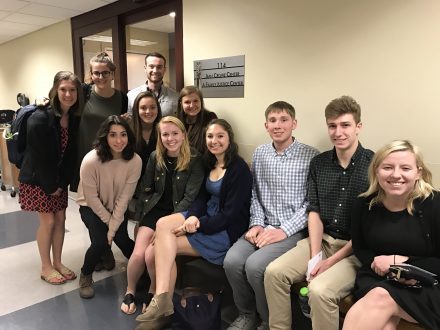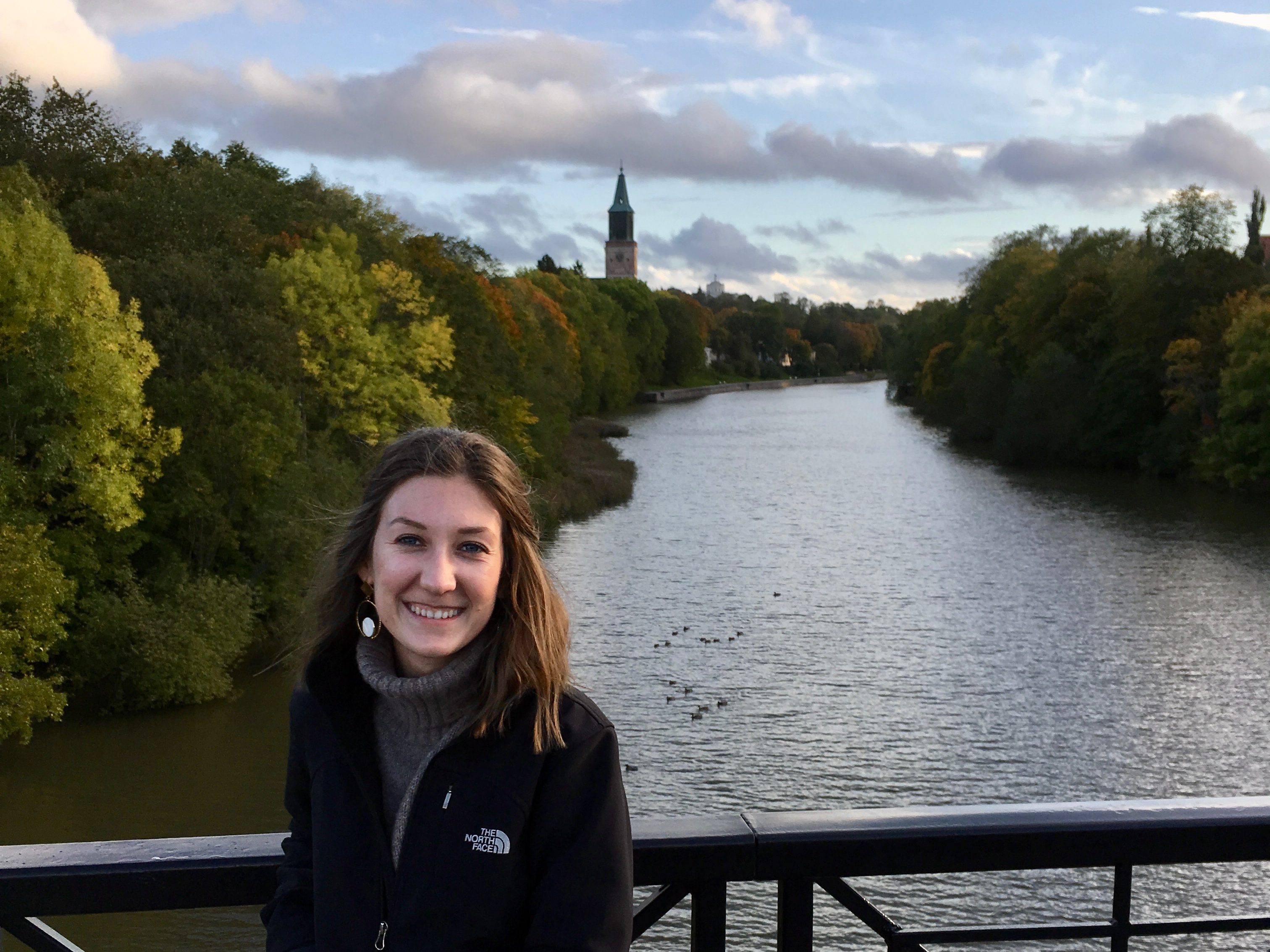Sarah Holdren '18' takes a look at her most recent achievements and how they rooted in everything she learned through her work in the Kernodle Center office, since the fall of her freshman year at Elon.
Sarah Holdren ‘18 recently returned to the U.S. after completing her Fulbright research in Finland. The Honors Fellow and Lumen Scholar is now attending Columbia University to complete her master’s degree in narrative medicine. Holdren would like to attribute her journey following graduation to everything she learned from her work with both Elon Volunteers! and the Kernodle Center for Service Learning and Community Engagement prior to graduating.
“Oh, 100 percent I would not be who I am without Kernodle. I guess on the EV! side of things — obviously they really helped me think more systematically more about my own privilege and think more about the reasons why I’m doing service. Of course there are benefits of service for the volunteer, so sort of really thinking about that mutual relationship and the motto: with not for the community. I still use that to this day when I’m thinking about my research or I’m going to med school next year and that’s a really big thing of like I want to be with my patients during their illness and not just sort of serving them from a distance. I want to walk step by step alongside them so that has really influenced my approach to how I’m going into medicine,” Holdren said.

The 2018 graduate was an anthropology and public health double major with a minor in chemistry. In the fall of her freshman year, Holdren worked as an office manager for the Kernodle Center. After doing a lot of service in high school, she knew she wanted to be involved in the office in some way. She slowly got involved in the blood drives Elon Volunteers! hosted and then lead an alternative break trip her junior year. Holdren then became the executive director of outreach and collaboration for the Kernodle Center as a senior.
In this position, Holdren worked to be more intentional about creating a family in EV! as well as being more intentional about how the center was connecting the academic component to the actual service work and then to the community partners. Holdren helped ensure there was dialogue surrounding the work the center was frequently engaging in as opposed to students just going in and doing the service work without reflection.
“Kernodle already does it so well, to not just go in and lead, but also sort of like tying in more of what are you guys talking about in your classes that is relevant to this and how can we think more deeply about the systemic issues at play and how can we maybe connect what people are doing for internships or research or any of the other Elon experiences with service work,” Holdren said.
One of the projects Holdren worked at Elon was what she called a community partner fair. It was a roundtable event that mimicked Elon’s organization fair that helps inform students about the broad variety of organizations they can become a part of. The main focus of this event was to allow students to speak to the leaders of these community partners and have conversations about their needs and what volunteers can do to help fill those.
“I think we also really tried in our fall training to sort of make sure we’re talking about those systemic issues there too. We did a privilege walk in the spring with our EV leaders and sort of started looking more inward I think and acknowledging it’s like a continual process both in what we’re doing in the community and with ourselves and how we’re like educating ourselves and growing in our leadership and service to understand our privilege,” Holdren said.
In her role in the Kernodle Center, Holdren was more intentional, particularly when collaborating with other student organizations and offices. For example, she helped coordinate a presentation that the Kernodle Center offered with the social justice organization on campus, called DEEP hosted by the Center for Race, Ethnicity, & Diversity Education (CREDE). At this presentation, students would speak about the differences in their approaches to service.
“The social justice organization came from a completely systemic level of advocacy and political action while the Kernodle Center came from a service-oriented and service-driven organization. So it was about where those meet in the middle and how when you’re not thinking about the social justice aspects of service, service can go badly sometimes. I think we both sort of presented the idea of unintended consequences of service and how a social justice lens can hopefully eliminate that and can improve the way we’re approaching our service,” Holdren said.
All of Holdren’s work and efforts in the Kernodle Center led her to where she is now. Following graduation, Holdren traveled to Finland as the recipient of a Fulbright Study/Research Award, which was an extension of research she conducted as a Lumen Scholar at Elon. Holdren’s Lumen focus was on qualitative research with breastfeeding mothers in the Neonatal Intensive Care Unit (NICU). She interviewed these mothers about their experiences.
“It’s really challenging to breastfeed in a NICU. Often you can barely even hold the baby let alone breastfeed, and that just ends up really bad for the biological processes that start lactation and obviously takes a huge toll on the mental health of the family as well,” Holdren said.
Holdren knew that Nordic and Scandinavian countries were doing what is referred to as family-centered care, which can be more beneficial than some of the approaches in the U.S. Through the Fulbright program, Holdren spent a year in Finland performing a comparative study that consisted of interviews with Finnish mothers about their experiences with lactation. Her research was published with her mentor, Professor Cynthia Fair, and can be read here.
“That was a really wonderful year. I think coming from an anthropology background I’ve always really loved traveling. I did a lot of studying abroad at Elon, but I think the Kernodle Center just in the ways that they served as mentors and sounding boards for reflection, really helped me connect those dots between my interest in culture, medicine and health care, to my interest in traveling to other communities, my interest in service and my interest in research. I think they just really – along with everything else I’ve done – taught me how to tell a really good story about myself and that is a huge skill that helps with every aspect of life,” Holdren said.
Holdren is now at Columbia University in the Master of Science in Narrative Medicine program. This is a master’s degree program that only exists at Columbia and focuses on medical humanities with a method. Holdren engages in philosophy, literature and other coursework that is applied to the clinical encounter to ultimately build an understanding of how a clinician can get to know and empathize with their patients better. This is actually a program that Holdren discovered at Elon and for which she received funding from the National Science Foundation.
“I’ve had these two really nice years that have been really intellectually interesting and I’ve grown a lot throughout them. I think through both of these experiences I’ve definitely been reflecting on everything. I definitely feel like the office helped me contextualize why I wanted to go to med school and help me figure out those two years off which were really healthy for me. I think I just challenged a lot of the biases I may have held before,” Holdren said.
Holdren plans on attending med school after completing her master’s degree. She can’t thank the Kernodle Center enough for being a second family and the constant care the staff had for her on all levels.
“It’s both a community and a place where I really grew academically and personally so I’m just so grateful. I can’t thank everyone there enough,” Holdren said.



